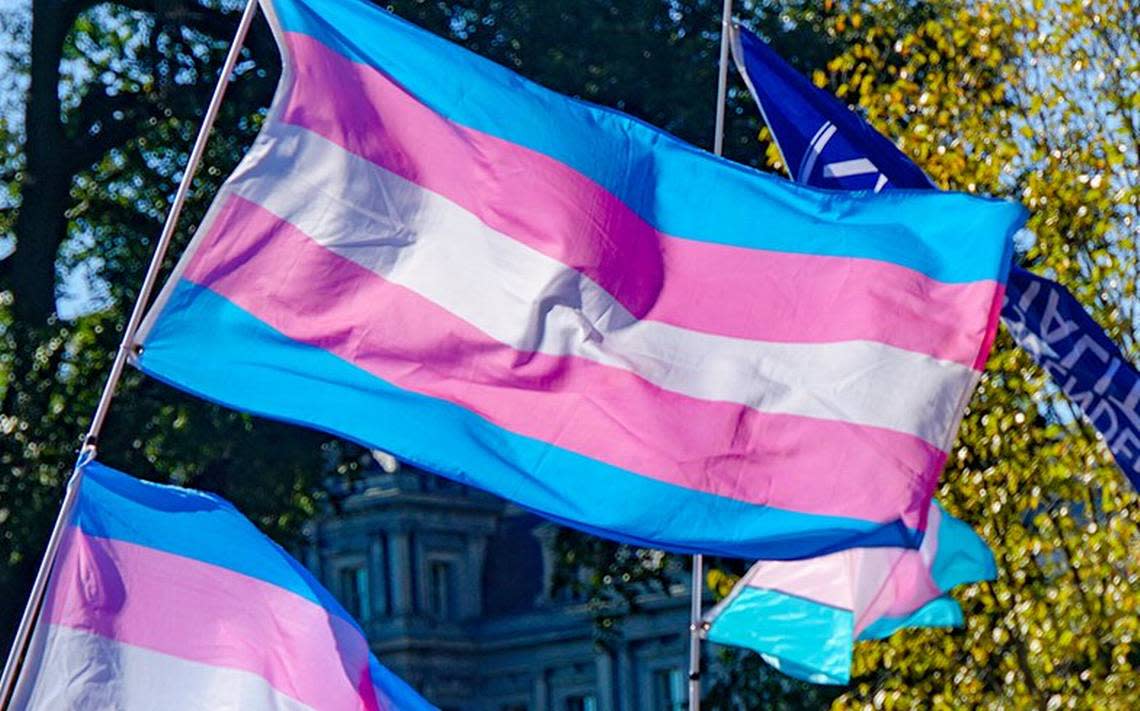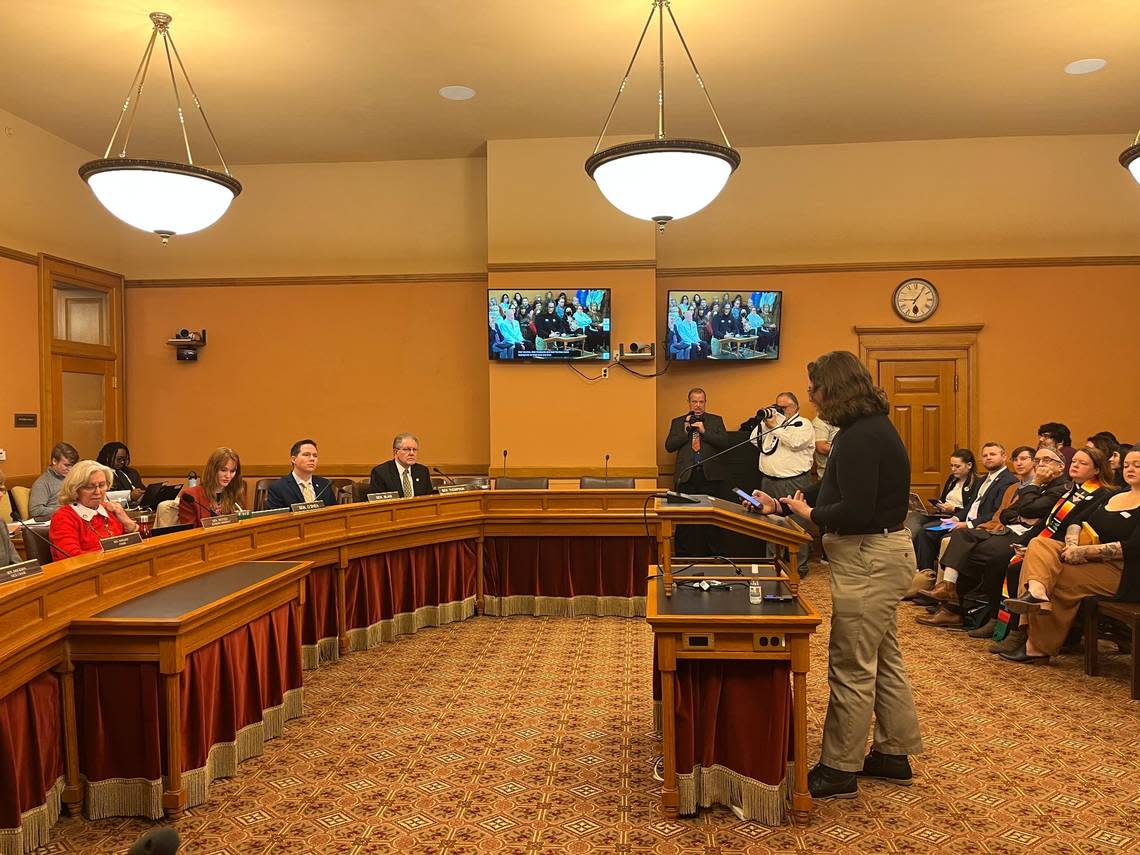Kansas, Missouri consider banning gender-affirming care amid wave of anti-trans bills
Adam Kellogg felt the “weight of the world” lift off his shoulders when he took his first shot of testosterone days before his 17th birthday.
He told Kansas lawmakers that he came out as transgender at 12. He went on hormone blockers a year later, at 13. And had his breasts removed after turning 18.
The series of treatments, he said, were key to his ability to move to college living as his authentic self, identifying as a transgender man. He is now a 19-year-old psychology student at the University of Kansas.
“Medical transition is not just about saving lives, it’s about emboldening and freeing them,” Kellogg said. “I can’t imagine such a life without medical interventions and I don’t want this committee to imagine it either.”
Republican lawmakers in both Kansas and Missouri on Tuesday held hearings on bills aimed at preventing doctors from providing gender transition surgeries or hormone therapies to minors.
Similar legislation is being considered in red states across the country. South Dakota Gov. Kristi Noem signed a bill Monday that also creates grounds for loss of license and civil lawsuits for doctors who perform the care. Missouri Attorney General Andrew Bailey is conducting an ongoing investigation into a center that provides gender-affirming care at St. Louis Children’s Hospital.
Tuesday was Kansas’ second of three days of hearings on bill that would affect the transgender community. Additional bills are being considered to ban transgender Kansans from women’s sports and from female-designated places.
Speaking to reporters Tuesday, Kansas Gov. Laura Kelly, a Democrat, said the string of anti-LGBTQ legislation moving through the state “breaks my heart” after working with children with emotional issues early in her career.
“It’s painful. And I really wish that the folks in the Legislature would recognize that, would be a bit more empathetic and cut it out,” she said.
“This is an ideological statement that has nothing to do with the welfare of the state of Kansas and is doing nothing in the interest of their constituents. It just needs to stop. It’s mean.”
Advocates for the legislation cite the potential for regret, and argue that gender transition care can cause long term harm. Minors, they say, are not old enough to make those decisions for themselves.
Two women who have detransitioned, Chloe Cole and Prisha Mosley, told Kansas lawmakers Tuesday that they received care too early, that it has caused lingering medical problems and that they did not get the help they needed from doctors after they detransitioned.
Both women have traveled nationally advocating for bans on gender affirming care. Cole is from California. Mosley said she received her transition care in North Carolina.
Mosley described her transition as “mutilation.”
“I needed trauma therapy but when I uttered the word gender I was fast tracked to transition,” Mosley said.
Luka Hein, a 21-year-old from Nebraska who began transitioning to a transgender man at age 16, told Missouri lawmakers that she regrets the procedure. Hein compared the hospital where she received the procedure to the St. Louis hospital currently under investigation.
“I was transitioned out of a university system alarmingly similar to the one we are now hearing a whistleblower from,” Hein said. “As a result of this, I am now 21 and trying to go back and I’m unable to. Parts of me are wasting away.”
Missouri bills come amid investigation St. Louis center
The World Professional Association for Transgender Health updated its guidelines in 2022 to allow for hormone treatment beginning at age 14 and some surgeries as early as 15 or 17, according to an Associated Press report from June. Many hormone treatments currently used, including puberty blockers, are reversible.
The Kansas legislation would remove licenses for doctors who provide gender transition care to minors and allow patients to sue if they regret the procedure later in life. The committee moved forward on the bill in place of separate legislation that sought to make doctors subject to criminal penalties for providing care to anyone under the age of 21.
In Missouri, the Senate Emerging Issues Committee on Tuesday heard three bills that would ban gender reassignment procedures for minors — including surgery, hormone therapy and other medications. The bills are part of a wave of legislation nationally that targets procedures that assist minors in transitioning genders.
Two of the Missouri bills, offered by state Sen. Mike Moon, an Ash Grove Republican, and state Sen. Denny Hoskins, a Warrensburg Republican, are identical. They would prohibit all “gender transition procedures” for individuals under 18, except in medical emergencies. Doctors also wouldn’t be allowed to refer patients to other providers.
The third bill, filed by state Sen. Jill Carter, a Neosho Republican, would impose the same restrictions but goes further in enforcement. Under her proposal, “coercing” a child into surgery or taking medication would be considered criminal child abuse. Doctors who violate the law would have their licenses revoked.
“Vulnerable populations are being taken advantage of,” Carter told the committee on Tuesday. “This is medically and morally appalling.”
The bills fly in the face of recommendations from prominent medical associations including the American Academy of Pediatrics which recommends gender affirming care be provided in an developmentally appropriate manner.
Dr. Dena Hubbard, public policy chair for the Kansas chapter of the American Academy of Pediatrics, testified in opposition to the Kansas bill arguing it unduly intruded on the doctor-patient relationship in a way that would ultimately harm the mental health of transgender children.
“Do we care for the mental health of all children or just cisgender children?” she said. Cisgender is a person whose gender identity corresponds with their sex assigned at birth.
Dr. Brandon Barthel, an endocrinologist at the Kansas City-based LGBTQ Specialty Clinic at University Health, testified against the Missouri bills. He said patients who have sought gender transition procedures have seen significant improvements in their lives.
“I can tell you firsthand that transgender individuals are not being rushed into treatment — quite the opposite,” he said. “The majority wait years before they can access care.”
Proponents of the Kansas bill dismissed the recommendations from medical associations as unreliable.
“Many of those organizations have been ideologically captured and politicized,” Arthur Schaper, field director for MassResistance, a right-wing activist group that opposes LGBTQ rights, told Kansas lawmakers.
Schaper and other proponents argued doctors who provide gender transition care are placing profits above children. Schaper said minors would grow out of gender dysmorphia if allowed to and likened transition care to child abuse.
Tuesday’s hearing in Missouri became tense at times. Scott Newgent, a transgender man who has spoken against gender transition procedures on national right-wing media outlets, was escorted out of the hearing after loudly criticizing state Sen. Greg Razer, a Kansas City Democrat, for opposing the bill and not returning his calls.
“You cannot transition your pain away, you can only add to it,” Newgent said during his testimony.
Razer, Missouri’s only openly gay state senator, became emotional during testimony by former state Sen. Bob Onder, who spoke in favor of the bills. Onder, during his testimony, pushed back on arguments that transgender kids who aren’t able to transition were at higher risk of suicide. He said many kids at a young age think about hurting themselves.
“You’re sitting in front of a senator who at 17 had a suicide note written and a gun in front of him,” Razer told Onder. “Don’t take this like it’s nothing.”
LGBTQ rights advocates say the bills target both transgender kids and doctors. They say Republicans have embarked on a sustained attack on the LGBTQ community.
Prior to the Missouri hearing, PROMO Missouri, an LGBTQ advocacy group, called on Missourians to sign a petition against the three bills. The petition had more than 990 signatures as of Tuesday afternoon.
“We’re preparing for the most dangerous attempt at banning transgender youth access to gender-affirming healthcare,” the group posted on Twitter.
Tuesday’s hearings come as Republican Missouri lawmakers have filed at least 28 bills targeted at the LGBTQ community. Missouri is behind only Oklahoma, which had 32 bills filed as of Feb. 10, according to a legislation tracker from the American Civil Liberties Union.
In Kansas, the ACLU has identified seven anti-LGBTQ bills. Lawmakers held a hearing Monday on a bill to ban transgender athletes from girls sports. Later this week they are set to consider legislation that would bar trans women from female designated spaces and ban local non-discrimination ordinances that go farther than state law to bar discrimination based on sexual orientation and gender identity.
Gender transition treatments have been under fire from conservatives in Missouri this month.
The ongoing investigation into the St. Louis transgender care center loomed over Tuesday’s hearing in Missouri. Carter, Moon and Hoskins each referenced the investigation in testimony supporting their bills.
The investigation followed allegations by Jamie Reed, a former employee at the center, who alleged that the center excessively provides hormone therapy to mentally ill children without first properly treating their underlying mental health issues. Reed also claimed that the center misleads the public and parents about the therapy services provided.
“Washington University has been a conveyor of child destruction,” Moon said on Tuesday.
Razer countered that the release of Reed’s allegations was convenient. He said he felt there were a lot of red flags in the timing of the release.
Washington University in St. Louis, the university which oversees the hospital, said last week it was looking into the allegations laid out in Reed’s article.
Shira Berkowitz, senior director of policy and advocacy for PROMO Missouri, told Missouri lawmakers on Tuesday that they should not consider Reed’s allegations as fact until the investigation is complete.
“Her one article and affidavit has been taken as more valid than the expertise of every major medical association in the country,” Berkowitz said. “Because this is currently under investigation, not a single point of her allegations have been proven true and should not be taken into consideration as we sit here now debating this bill. While Jamie Reed is one person, she is part of a much larger machine.”
This story was updated to correct the spelling of Adam Kellogg’s name.








